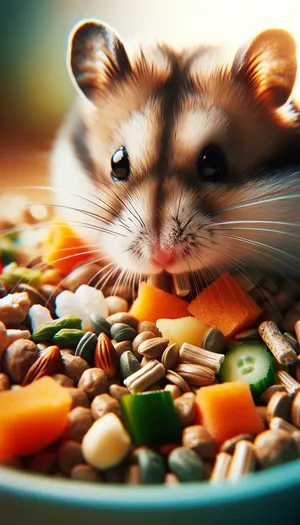This comprehensive guide aims to educate pet owners on providing the best nutrition for their hamsters by addressing common misconceptions about hamster food and diets.
This article is intended for pet owners who want to ensure their hamsters receive the ideal diet for their health and well-being.
Understanding the Nutritional Needs of Hamsters
Hamster Diet in the Wild
Hamsters are omnivorous creatures, meaning they consume various foods in the wild. Their diets typically consist of seeds, nuts, fruits, and insects. In captivity, it’s essential to replicate this diverse diet to ensure their overall health.
Balancing Nutrients for Health
A balanced diet is essential as it provides them with the necessary proteins, fats, carbohydrates, vitamins, and minerals. By understanding their unique dietary needs, pet owners can make informed choices when feeding their furry companions.
Choosing the Right Hamster Food
Reading Food Labels

It is crucial to read the labels on hamster food packaging to determine if it meets your pet’s nutritional needs. Look for products that contain a variety of seeds and grains, as well as added vitamins and minerals. Some commercial foods are specifically formulated for certain hamster breeds or age groups, so consider these factors when choosing.
Benefits of Commercial Food
Commercially prepared hamster food offers a convenient and balanced option, ensuring that your hamster receives vital nutrients in the correct proportions. Discover why these products can simplify your hamster’s diet.
Essential Components of a Healthy Hamster Diet
Protein for Growth and Health
A healthy hamster diet should include essential components such as protein, fiber, vitamins, and minerals. Specifically, protein is crucial for growth and tissue repair, while fiber helps maintain digestive health. Learn more about the importance of protein in your hamster’s diet.
Introducing Fresh Foods
Pet parents should provide a varied diet that includes hamster-safe fruits, vegetables, and treats, introducing new foods gradually to prevent digestive upset. Fresh water should always be available to ensure hydration. Explore the benefits of incorporating fresh foods into your hamster’s diet.
Busting Common Misconceptions about Hamster Food
Human Foods to Avoid
There are several misconceptions surrounding hamster food that need to be addressed. Contrary to popular belief, not all human foods are safe for hamsters, and some can be harmful. Discover the common human foods that should never be fed to your hamster.
Portion Control for Health
Additionally, overfeeding or underfeeding hamsters can negatively impact their health. Be sure to follow recommended portion sizes and monitor your hamster’s weight to ensure they maintain a healthy body condition. Learn how proper portion control contributes to your hamster’s well-being.
Practical Tips for Feeding Hamsters
Hoarding Behavior
It’s important to note that hamsters are known for storing excess food in their cheek pouches, which they may hoard in their nests. This natural behavior should be taken into account when determining portion sizes. Understand the fascinating hoarding behavior of hamsters.
Ensuring Dietary Consistency
Feeding hamsters involves careful planning and portion control. Pet parents should create a meal plan with a balanced mix of hamster food, fresh fruits, vegetables, and occasional treats. The feeding frequency should be consistent, and any dietary changes should be introduced gradually to avoid digestive issues. Storing and handling hamster food properly helps to maintain its freshness and nutritional value for longer. Get practical tips for ensuring your hamster’s dietary consistency.
Providing Enrichment through Food Variety
Encouraging Foraging Behavior
Hamsters are naturally inclined to forage for their food in the wild. You can replicate this behavior in captivity by providing a variety of foods in different locations within their habitat. Scatter food or hide it in puzzle feeders to stimulate their foraging instincts. This not only provides mental stimulation but also adds an element of fun to their mealtime.
Rotating Food Options
Just like humans, hamsters can get bored with the same food every day. To keep their diet interesting, rotate the types of food you offer. Include different seeds, nuts, and vegetables on different days. This variety prevents dietary monotony and ensures your hamster receives a wider range of nutrients.
Homemade Hamster Treats
Consider making homemade hamster treats occasionally. You can find numerous recipes online for hamster-safe treats made from ingredients like oats, carrots, or unsalted nuts. These treats can be a special way to bond with your pet and introduce new flavors into their diet. Always ensure that any homemade treats are safe and suitable for hamsters.
Monitoring Your Hamster’s Health
Regular Weight Checks
Maintaining your hamster’s health involves monitoring their weight regularly. Sudden weight loss or gain can be a sign of underlying health issues. Weigh your hamster consistently and record their weight to ensure they stay within a healthy range.
Consult with a Veterinarian
If you notice any changes in your hamster’s eating habits, energy levels, or overall behavior, consult a veterinarian specializing in small animals. A professional can guide your hamster’s diet and health, promptly addressing any issues.
Dental Health
Hamsters’ teeth continuously grow, so they must be provided with items to chew on, such as chew sticks or mineral blocks. This helps wear down their teeth and prevents dental problems. Dental health is crucial for their ability to eat and overall well-being.
By incorporating these practices into your hamster care routine, you can ensure that your furry friend enjoys a well-balanced diet and lives a happy and healthy life.










